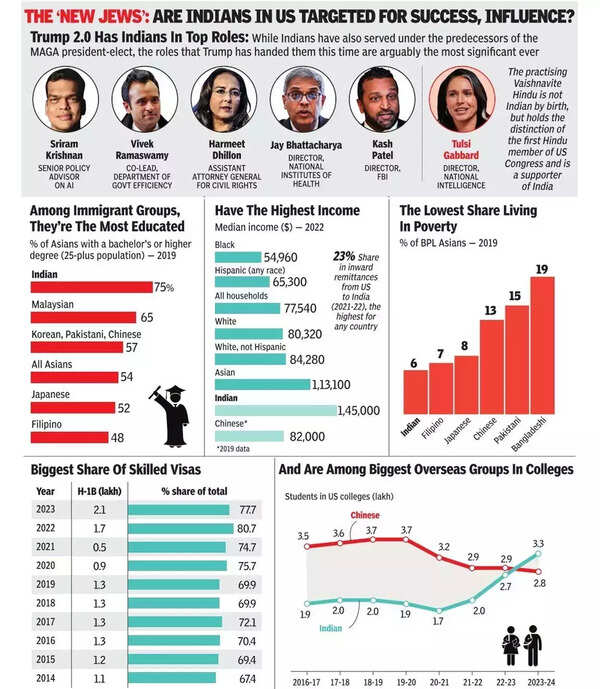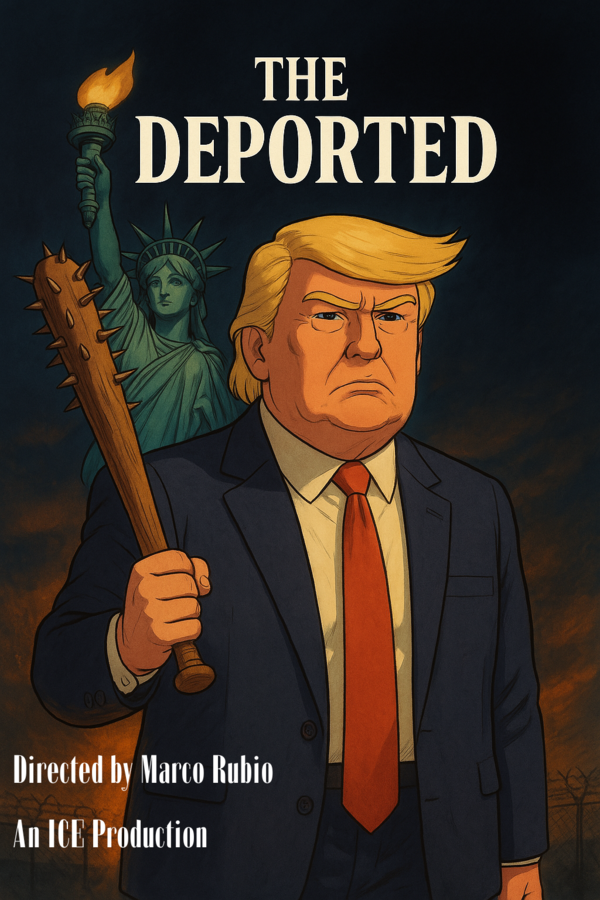While caste has become a prickly topic in America – particularly with Dismantle Global Hindutva campaigns and the zeal to uncover casteism where it doesn’t exist – comedian Nimesh Patelonce offered a succinct explanation of the real Indian-American hierarchy. At the top, he joked, were the doctors, engineers, and CEOs — the men who made Indian-Americans the model minority.But they all came to drown their sorrows with the Indians at the bottom of the hierarchy: the liquor store Patels. Of course, Nimesh Patel’s social critique skipped over the Jhumpa Lahiri-reading diaspora of upper-middle-class ennui, but that’s an ontological discussion for another day.
Which brings us to the one Patel who simply doesn’t fit into any version of the Indian hierarchy. Kashyap ‘Kash’ Pramod Patel — the breaker of every Indian-American stereotype — who became the first Hindu and Indian-origin man to lead the FBI.
SPEECH WRITER
When Donald Trump visited India in 2020 and rattled off Indian names and cultural references like your neighbourhood WhatsApp uncle, the speech was written by Patel — Trump’s close aide, future National Security Council staffer, and now FBI Director. One of the most powerful men in the US, if not the world.And what makes Patel so extraordinary is precisely how he doesn’t conform to any of the standard Indian-American tropes — not Apu, not Sundar Pichai, not Bobby Jindal in his final form. His parents fled Idi Amin’s tyranny in Uganda, first moving to East Africa, then Canada, before finally settling in the US. Patel was raised in a household deeply rooted in Hindu faith, imbibing Swami Vivekananda’s teachings of universal tolerance and interfaith respect — values that, ironically, Trump would later butcher while mispronouncing Vivekananda’s name in Ahmedabad.While most Indian-American kids were pushed toward medicine, engineering, or safe corporate jobs, Patel became a public defender — the most thankless, least glamorous legal role in the American system. He wasn’t billing hours at a Wall Street firm; he was defending drug dealers and murderers in Miami-Dade.Then, like Johnny Lawrence in Cobra Kai, he flipped the script.
JUSTICE
In 2014, Patel joined the Department of Justice as a national security prosecutor, going after terrorists. The brown guy who once defended the accused now hunted them down in the maze of post-9/11 national security law.From there, he jumped into the political deep end — not as a hopeful Democrat who is Hindu lite, but as a Republican staffer helping Devin Nunes dismantle the Russiagate narrative. Most Indian-Americans dream of bipartisan approval. Patel wanted war. He authored the infamous Nunes memo, became the bane of MSNBC, and the darling of Trumpworld. And unlike the typical desi backstage operator, Patel wanted to be seen.Loud, pugnacious, unrepentant. There were whispers he’d become CIA Director. Or National Security Advisor. Instead, he took over the FBI — the very agency whose leadership he once called a “gang of thugs.”In any other world, that would’ve been disqualifying. For Patel, it became the brand. And what a brand it is.
SANSKARI MAGA
A brand where he could date a country singer, win the hearts of Christian MAGA diehards, and still chant “Jai Shree Krishna” while touching his parents’ feet. He’s both the destroyer of Russiagate and the hero of his own children’s books — literally starring in them. He’s one of the few mainstream figures who’ll say without flinching that a temple stood in Ayodhya before the Babri Masjid.He’s also reportedly fonder of parties than policy meetings, and wants FBI leakers to undergo polygraph tests. Because why not?What makes his rise even more fascinating is how he subverted both his faith and his ethnicity into political weapons — in ways that would make the average Ivy League-trained desi activist squirm. Bobby Jindal and Nikki Haley sanitised their names and background for approval. Patel doubled down. He shares articles on how Hindu dharma shaped his worldview. He’s not asking to be let in. He’s kicking down the door.Mainstream media has mostly ignored his ascent — because immigrant stories are only celebrated when they colour within the lines.But for a community that prides itself on respectability politics — think Sundar Pichai, Satya Nadella, or even Kamala Harris — Patel is a slap in the face. He didn’t make it by being inoffensive. He made it by being incendiary. He’s not trying to represent brown America. He’s trying to dominate Washington. He doesn’t want validation. He wants power.
AMERICAN-BORN CONFIDENT DESIS

And in that, Kash Patel might just be the most American Indian-American of them all.Because the American Dream was never about gratitude. It was about domination. And Patel — Trump’s dharma warrior — understood that better than most. He’s ready for war. Always.He’s not the final form of Indian-American evolution. But he is a fork in the road. A rogue signal. A reminder that you don’t need to code-switch, bow politely, or marry within your community to succeed. You can wear your sacred threads, punch left on Fox News, and still walk into Quantico or Langley like you own the building.The Patel parents who fled Idi Amin’s brutality couldn’t have imagined their son would one day run the FBI. But even more unimaginable is how he did it — not by code-switching or checking boxes, but by blowing up the boxes altogether.Kash Patel didn’t just succeed. He broke the algorithm. He rewrote the narrative. Loud, proud, and absolutely off-script.And that, more than anything, is his legacy. In his world, the model minority is obsolete. The rogue operative reigns. He isn’t here to fit in. He’s here to take over. Whether that’s good or bad for the community is debatable.But the idea that one must become palatable to be powerful — that immigrant success must come pre-wrapped in humility and gratitude — Patel shattered that myth like a man kicking in the doors of Langley.And maybe that’s why his story rattles so many.

For decades, Americans have pointed to the Statue of Liberty and quoted Emma Lazarus’ immortal lines:“Give me your tired, your poor,Your huddled masses yearning to breathe free…”The poem, written in 1883, was meant to welcome the tempest-tossed and the rejected — the exiles who believed in starting anew at the golden door.But what if one of those huddled masses grew up, stormed the gates, and decided he didn’t just want to breathe free — he wanted to run the damn place?That’s Kash Patel.His rise doesn’t come with violins or teary-eyed monologues about belonging. It comes with polygraphs, podcasts, and political warfare. It’s messy, polarising, and, in its own chaotic way, quintessentially American. How Patel’s story is as remarkable as any immigrant who has come to America — whether liberals swear by it or not — is a different matter. But if the golden door was meant for the bold, the brash, and the defiant, then Kash walked through it with combat boots on and never looked back.




